The superstructure of Islam is raised upon five pillars as Prophet Muhammad (peace be upon him) told, as reported on the authority of `Abdullah bin Omar bin Al Khattab (may Allah be pleased with him) who said: “I heard the Messenger of Allah (peace be upon him) say: “(The superstructure of) Islam is raised on five (pillars): testifying that there is no god but Allah, that Muhammad is His servant and Messenger, observance of Salah (Prayer), fulfilment of Zakat (Poor Dues), performing Hajj (Islamic Pilgrimage) to the House (the Sacred Mosque of Makkah), and Fasting of Ramadan.” [Reported by Bukhari No. (8) and Muslim, No. 19-(16)].
1. The Two Testimonies of faith
They constitute the key to Islam. The first testimony, “There is no God but Allah” means an acknowledgement by the tongue of the belief ingrained in the heart that there is no god worthy of worship but Allah. This entails that a Muslim should rely on Allah, put endless trust in Him and His disposition of all affairs, and believe that He is the One Creator of the universe, Alone without any partners.
The testimony that Muhammad is the Messenger of Allah means to believe that Prophet Muhammad (peace be upon him) is sent as a mercy to the worlds, a bearer of good news, and a warner, to all mankind and jinn. It necessarily entails that a Muslim should obey the teachings of Prophet Muhammad (peace be upon him) by doing what he commanded and avoiding what he forbade, as Allah, Glorified is He, says in the Holy Qur’an: “… so accept whatever the Messenger gives you, and abstain from whatever he forbids you...“ [Surat Al-Hashr: 7].
2. Observance of Salah (the Prayer)
Salah is the connection between us and Allah, our Lord. It has a special status in Islam and is the first thing a Muslim will be held accountable for on the Day of Resurrection. It is the pillar of faith, so if one observes it as should be, all his deeds will be set to rights, and if neglected or performed carelessly, all one’s deeds will be rendered futile. Muslims are ordained to observe five daily obligatory Salah (Prayers) and any but these five are voluntary. Every Muslim should perform Salah at the prescribed times and in the manner Prophet Muhammad (peace be upon him) taught us, as he said: “Observe Salah as you have seen me do.” [Reported by Bukhari No. (605), on the authority of Malik bin Al-Huwayrith].
3. Zakat (Poor Dues)
Zakat is a financial worship ordained by Allah for whoever possesses the minimum taxable amount, which is estimated to equal eighty-five grams of gold. It is meant to purify souls from greed, and Allah rewards its doers by blotting out their sins. Allah Almighty says in the Glorious Qur'an: “Take Sadaqah (alms) from their wealth in order to purify them and sanctify them with it…” [Surat At-Tawbah: 103].
The prescribed payable amount of Zakat is 2.5% of an amount that reaches the prescribed taxable rate and remains unspent for a whole lunar year. Unless a Muslim possesses such amount that meets the aforesaid conditions, he is exempted from Zakat. The poor and needy are among the lawful recipients of Zakat; Islam does not leave distribution of Zakat to our discretion, but allocates eight channels where Zakat may be spent.
Allah Almighty says in the Glorious Qur'an: “Alms are for the poor and the needy, and those employed to administer the (funds); for those whose hearts have been (recently) reconciled (to Truth); for those in bondage and in debt; in the cause of Allah. And for the wayfarer: (thus is it) ordained by Allah, and Allah is full of knowledge and wisdom.” [Surat At-Tawbah: 60].
4. Fasting of Ramadan
Fasting of Ramadan is among the tenets of Islam. Ramadan is a blessed time where doing righteous deeds is more recommended and more abundantly rewarded. It is a blessed month where Allah sends down His Mercy amply and a chance for one to renew his covenant with Allah and get closer to Him by doing good deeds. Fasting in Ramadan is matchless in reward; Allah promises Forgiveness to whoever observes it with faith and confidence in Allah’s reward. In Ramadan, a Muslim is commanded to abstain from food, drink and the intimate marital relationship – for those who are married- from dawn till sunset. Exempted from this obligation are those who are not able to fast, as for sickness or travel. Allah Almighty says in the Qur’an: “… but if any of you is ill, or on a journey, the prescribed number (should be made up for) on later days…” [Surat Al-Baqarah: 184].
5. Hajj (Pilgrimage to the Sacred Mosque of Makkah for Those who Can Afford it)
Hajj (the Arabic for pilgrimage) linguistically means: setting out to visit a sacred place. Juristically, it means the ritual of visiting the Sacred Mosque of Makkah, standing in `Arafah, and circulating round the Ka`bah. Hajj is ordained for every adult Muslim who has the financial and physical capacity to observe it. Allah Almighty says in the Qur’an: “… Pilgrimage to the House is a duty owed to God by people who are able to undertake it…” [Surat Ali `Imran: 97] Allah has prescribed Hajj for us in order to purify our souls and train us on devotion, obedience, and patience, as Prophet Muhammad (peace be upon him) said: “Whoever performs Hajj to this House (the Sacred Mosque of Makkah) without rafath (the intimate marital relationship or indecent speech) or acting sinfully will return as sinless as the day he was born.” [Reported by Al-Bukhari No. (1449) and Muslim No. 438-(1350), on the authority of Abu Hurayrah (May Allah be pleased with him)]
This is a detailed explication of the fifth tenet of Islam, Hajj, for those who seek more information
Hajj is the fifth of the tenets of Islam. It is distinguished by the fact that it combines the wisdom and benefits involved in all the other four tenets together.
Language defines Hajj as “setting out to visit a sacred place."
The juristic definition of Hajj is “visiting specific places at specific times and observing specific rituals”.
The Virtue of Hajj
Abu Hurayrah (may Allah be pleased with him) reported that Prophet Muhammad (peace be upon him) said:
"Whoever offers Hajj for the sake of Allah without rafath (the intimate marital relationship or indecent speech) or acting sinfully will return as sinless as the day he was born."
The Prerequisites for the Obligation of Hajj
-
To be a Muslim;
-
To have the capacity to perform Hajj;*
-
To be an adult;
-
To be free (not a slave, in the classical sense of the word)
Capacity includes the following:
-
Physical health;
-
Non-imprisonment; freedom from detention;
-
If a women, she must not be observing her waiting period (after divorce or husband’s death);
-
Road safety;
-
If a woman, she must be accompanied by either her husband or any other mahram (an unmarriageable kin; a man with whom a relationship would be a case of incest).
Prerequisites for the Validity of Hajj
-
Being a Muslim;
-
Entering into the state of consecration for Hajj (Ihram) at the right place;
-
Performing the rituals in person, unless for a juristically valid excuse;
-
Entering into the state of consecration for Hajj (Ihram);
-
Being past the age of discernment (when a child begins to reason; at seven more or less);
-
Avoiding the intimate marital relationship;
-
Entering into the state of consecration for Hajj (Ihram) at the right time;
-
Sanity
The Three Ways of Performing Hajj
-
Ifrad: It is to harbour the intention to offer Hajj only.
-
Tamattu': It is to start with the intention of performing `Umrah (lesser, voluntary pilgrimage) first. (i.e. to enter into the state of consecration (Ihram) for `Umrah before setting out for the journey then entering into the state of consecration for Hajj, after finishing `Umrah, in the city of Makkah).
It has been give this name Tamattu` (the Arabic for enjoyment) since a pilgrim is allowed to enjoy freedom from the limitations of Ihram in the interval between `Umrah and Hajj.
-
Qiran: It is the intention to offer both Hajj and `Umrah together (i.e. a pilgrim enters into the state of consecration (Ihram) for both Hajj and `Umrah together).
Allah Almighty says in the Qur’an: “… Anyone wishing to take a break between the minor pilgrimage and the major one must make whatever offering he can afford. If he lacks the means, he should fast for three days during the pilgrimage, and seven days on his return, making ten days in all. This applies to those whose household is not near the Sacred Mosque...” [Surat Al-Baqarah: 196]
A pilgrim who offers either Qiran or Tamattu' must offer a sheep (sacrificial animal) as a demonstration of thanksgiving to Allah Almighty for helping him offer both `Umrah and Hajj during the months of Hajj in the same journey to the Holy Lands. If a pilgrim cannot afford a sacrificial animal, he has to fast for three days during the Hajj and seven days when he returns home.
Preparation for the Hajj Journey:
The following should be done before setting off for Hajj:
-
Turning to Allah in repentance from all your sins;
-
Making amends to others for injustices or rights you owe them;
-
Securing the expenses required for the journey through lawful means;
-
Seek a righteous companion who helps and encourages you to do good deeds;
-
Undertaking to do the following:
-
Strictly avoiding committing sins;
-
Treating the Sunnah (Teachings) of Prophet Muhammad (peace be upon him) with much reverence;
-
To direct your intention sincerely to Allah and observe Hajj for the sole aim of pleasing Him;
-
Devoting yourself to worshiping Allah;
-
Avoiding arguing, quarrel, fight and occupying one's mind with others.
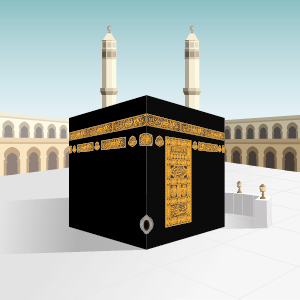
Recommended Acts and Invocations during travel to Hajj
It is a recommended act of Sunnah for the pilgrim to bid farewell to his family, relatives, and friends before he sets off for Hajj.
A traveller is advised to say to those he leaves behind: “I entrust you with Allah Whose trusts are never lost.”
A resident is recommended to pray for a traveller, saying: “I entrust your faith, your trust (family, property, etc.), and the conclusion of your deeds with Allah. May Allah bestow His Care and Protection on you. May Allah grant you piety, forgive your sins, and guide you to what is good and right wherever you go.”
Before departure, it is encouraged for a pilgrim to observe a two-Rak`ah Salah, as a voluntary act of Sunnah upon travel. After reciting Surat Al-Fatihah, it is recommended in the first rak'ah (unit of Prayer) to recite “Surat Al-Kafirun” and in the second Rak`ah “Surah Al-Ikhlas”.
After finishing Salah, it is recommended to recites “Ayat Al-Kursi” (“Verse of the Throne”, Ayah No. 255 of Surat Al-Baqarah).
Upon leaving home, a pilgrim is recommended to recite the following prayers:
Bismillahi tawakkalto ‘ala Allah, la hawla wa la qowwata ella billah. Allahumma enni a’udh bika an adil aw udal, aw azil aw uzal, aw adhlim aw udhlam, aw ajhalu aw yujhalu ‘alai.
“[I set out] In the Name of Allah. I place my trust in Allah. There is no might or strength except through Allah. O Allah! I take refuge with You lest I should lead anyone astray or be led astray, cause anyone to slip or be caused to slip, oppress anyone or be oppressed, or behave foolishly to anyone or be treated foolishly by anyone.”
After getting into the means of transport, a pilgrim is recommended to recite, “Allahu Akbar” (Allah is the Greatest) three times then say:
Subhana alladhi sakhara lana hadha wa ma kunna lahu muqrenin wa enna ela Rabbina la munqalebun. Allahumma hawwen ‘alayna safarana hadha wa atwi ‘anna bu’dah. Allahumma anta as-sahebu fi es-safar wa al-khalifatu fi el-mal wa al-ahl. Allahumma enni a’udhu beka men wa’tha’ as-safar wa ka’abatul mandhar wa su’-ul-munqalab fil mali wal ahl.
"Exalted is He Who has made this (means of transport) at our service, and we ourselves would not have been capable of that, and to our Lord is our final destiny. O Allah, facilitate our journey and let us cover its distance quickly. O Allah, You are The Companion on the journey and The Successor over property and family. O Allah, I take refuge with You from the difficulties of travel, gloominess of sights, being in a bad predicament, and finding an ill-fated outcome with wealth and family on our return.”
Then, it is encouraged to recite Ayat Al-Kursi, Surat Al-Ikhlas, Surat Al-Falaq, and Surat An-Nas.
Ifrad
It is a manner of observing Hajj where a pilgrim enters into the state of consecration (Ihram) at the miqat (the prescribed place for Ihram) with the intention to perform Hajj only. Then, a pilgrim starts Talbiyah (recital of the special prayers of Hajj) and remains in the state of Ihram until he finishes the ritual of standing in `Arafah. Then, he throws Jamrat Al-`Aqabah (the Stoning Ritual) and breaks free from the state of Ihram.
The logical plan displayed at the right hand side of the screen shows the path of a pilgrim performing Ifrad step by step.
Allah Almighty says in the Qur’an:
“The Hajj (pilgrimage) is (in) the well-known (lunar year) months (i.e. the 10th month, the 11th month and the first ten days of the 12th month of the Islamic calendar, i.e. two months and ten days). So, whosoever intends to perform Hajj therein by assuming Ihram), then he should not have sexual relations (with his wife), nor commit sin, nor dispute unjustly during the Hajj. And whatever good you do, (be sure) Allah knows it. And take a provision (with you) for the journey, but the best provision is At-Taqwa (piety, righteousness, etc.). So, fear Me, O men of understanding!”
Ihram (Entering into the State of Consecration)
Ihram consists of two elements: the intention to observe the ritual and the Talbiyah (recital of the special prayers of Hajj).
A pilgrim enters into the state of Ihram at the Miqat (prescribed place and time for Ihram) or shortly before, to ensure correctness of observance.
Upon entering the state of Ihram, a pilgrim is advised to do the following:
-
Cut his hair or shave it, based on his habit (this is -needless to say- for men only);
-
Tame the nails and remove pubic hair;
-
Take a bath and perform ablution;
-
Wear a wrapper and a garment of unsown white cloth, preferably newly made;
-
Wear perfume and pray a voluntary two Rak`ah Salah in other than the times where observing voluntary Salah is discouraged.
Afterwards, a pilgrim should harbor the intention for Hajj by heart and may also declare such intention verbally as follows:
Allahumma inni urid-ul-Hajj fa yasserhu li wa taqabbalhu menni. Nawayt-ul-Hajj wa ahramtu behi llillahi ta’ala, fa en habasani habis, famahalli haythu habastani.
“O Allah! I intend to perform Hajj, so make it easy for me and accept it from me. I intend to offer Hajj and have entered into the state of consecration (Ihram) for Hajj for the sake of Allah Almighty. If I am detained by anything (that prevents me from observing or accomplishing Hajj), my release from Ihram will be where I am detained.”
Then the pilgrim says the Talbiyah as follows:
Labbayk Allahuma labbayk. Labbayka la shareeka laka labbayk. Inna alhamda wan-ni'mata laka wal mulk. La shareeka lak.
“Here I am, O Allah! Here I am, at Your service! You have no partner. Here I am! All praise, grace and sovereignty belong to You. You have no partner.”
After repeating Talbiyah three times, a pilgrim concludes by invoking blessings on Prophet Muhammad (peace be upon him). A pilgrim repeats Talbiyah whenever he climbs a hill, descends a valley, gets into or out of a vehicle, meets friends and acquaintances, and at the end of each Salah.
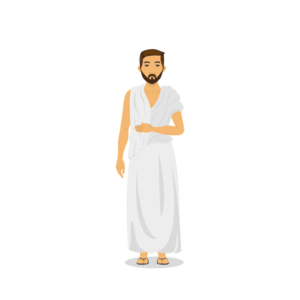
Entering Makkah
When a pilgrim approaches Makkah, he should says:
Allahumma hadha haramuka wa amnuk, fa harremni ‘ala an-nar wa ammenni min ‘adhabika yawm tab’athu ‘ebadak, wa aj’alni min awliya’ika wa ahli ta’atek.
“O Allah! This is Your Sanctuary and Place of Security! Save my body from Hell-Fire. Secure me against Your torture on the Day when You resurrect Your servants. Make me among Your pious, obedient servants.”
After entering Makkah, a pilgrim says:
Allahumma al-baladu baladuk, wa al-baytu baytuk. Ji’tu atlubu rahmatak, wa ‘a’ummu ta’atuak muttabe’an li amrek. As’aluka mas’alata al-mudtar elayk al-mushfiqi min ‘adhabek an tastaqbilani bi ‘afwek, wa an tatajawaza ‘anni bi rahmatik, wa an tudkhelani jannatak.
"O Allah! This is Your town and Your House. I have come seeking Your Mercy and intending to observe worship for You, in obedience to Your commands. I pray to You in my utmost need, fearing Your torture, that You receive me with Your Pardon, overlook my sins with Your Mercy, and admit me into Your Paradise.”
Then, a pilgrim invokes blessings on Prophet Muhammad (peace be upon him).
Entering the Sacred Mosque of Makkah
-
It is recommended to enter through Bab-us-Salam (the gate of Peace).
A pilgrim enters with his right foot, sending peace and blessings to Prophet Muhammad (peace be upon him) and invoking:
“O Allah! Forgive my sins and open for me the gates of Your mercy.”
“O Allah! This is Your Haram and Your secure place, I ask You to protect my flesh, skin, blood, brain and bones from Hell-Fire.”
-
When he sees the Ka`bah, he utters Tahlil and Takbir saying “La-ilaha-illa-Allah, Allahu Akbar” (“there is no god but Allah and Allah is the Greatest”)
-
He repeats this Tahlil and Takbir for three times raising his hands and supplicating because the supplication made at sighting the Ka`bah is accepted:
“O Allah! Make my invocations accepted in all that which is good.”
“I seek protection from the Lord of the House against debt, poverty, narrowness of the chest and from the torture of the grave.”
“O Allah! I beseech You to pardon me, grant me mercy and save my neck from the Hell-Fire.”
-
Or a pilgrim invokes Allah to grant him whatever he needs and he sends peace and blessings to Prophet Muhammad (peace be upon him) saying: “O Allah! Increase the honour, dignity, and reverence of Your Sacred House and increase whoever visits it either in Hajj or `Umrah in honour, respect, nobleness, and righteousness.” “O Allah! You are peace, and from You comes peace. Our Lord, receive us with peace.”
Tawaf
-
At the beginning of Tawaf, it is recommended for a pilgrim to face the Ka`bah, placing the Black Stone on his right. Then he moves to position himself to face the Black Stone and intends Tawaf (either the Tawaf of `Umrah or Tawaf Al-Qudum).
-
He starts from the brown marble line saying: (Bismillah, Allahu Akbar) “In the name of Allah, Allah is the Greatest.” “O Allah! Having faith in You, confirming the truthfulness of Your Holy Book, fulfilling Your promise and following the Sunnah of Your Prophet (peace be upon him).”
-
The pilgrim touches the Black Stone and kisses it, if possible.
-
If it is too difficult to kiss it, he touches it with his right hand and kisses his hand.
-
If that isn’t possible he stands facing the Black Stone and points to it with his hand once while saying: “Bismillah, Allahu Akbar” (in the name of Allah, Allah is the Greatest). Then he starts Tawaf.
How to point correctly to the Ka`bah?
A pilgrim raises his hands alongside his shoulders making the inner part of his hands (palms) directed towards the Black Stone and he points to the Ka`bah with his hands one time only.
-
Tawaf is performed seven rounds and it is part of the Sunnah to move quickly (Ramal) in the first three rounds and exposing the right shoulder by throwing the upper sheet of the Ihram dress over the left shoulder (Idtiba` - for males only) during all rounds.
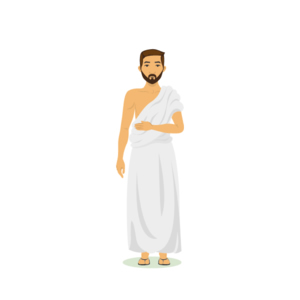
-
This case is only for Tawaf, which is followed by Sa`y between Safa and Marwah.
-
Ramal and Idtiba` are only for men and are practiced only during Tawaf, which is followed by Sa`y. So, whenever a pilgrim finishes Tawaf, he covers his shoulders.
-
A pilgrim (during Hajj) recites at the gate of the Ka`bah:
“O Allah! The House is Yours, and the Haram is Yours, and the peace is Yours, and this is the place of he who seeks Your protection.”
-
He says at the Iraqi Corner:
“O Allah! I seek refuge in You from doubt and from shirk, from discord, hypocrisy, ill-manners, and calamity in property, family, and children.”
-
He says between the Shami Corner and the Yamani Corner:
“O Allah! Make my Hajj accepted, my effort accepted and recognized, my sin pardoned, my deeds accepted and grant me a trade that will never fail, You are the Exalted in might, the Oft-Forgiving.”
-
Istilam (touching) the Yamani Corner is desirable whenever the pilgrim passes by it during Tawaf, by touching the Corner with his palms or with his right hand. If this is not possible, he should point towards it. Invocation is recommended at the Yamani Corner because it is surely accepted since there are seventy thousand angels there who say “Amen.”
In order for the Tawaf to be correct, a pilgrim must stop completely at the Yamani Corner.
-
A pilgrim recites between the Yamani Corner and the Black Stone: “Our Lord, give us in this world [that which is] good and in the Hereafter [that which is] good and protect us from the punishment of the Fire.”
“O Allah! Save me from disbelief, want, and disgraceful situations in this world and in the Hereafter.”
-
He invokes often in the first three rounds: “O Allah! Make my Hajj accepted, forgive my sins, accept and recognize my effort.”
-
He recites in the other four rounds: “O Allah! Forgive, grant mercy, pardon and favour, and excuse us for things You know about us, You are the Most Powerful, the Most Generous.”
-
A pilgrim makes continuous invocations, asking for the good of this world and the good of the Hereafter.
-
At the end of the Tawaf, a pilgrim touches and kisses the Black Stone or points at it with his palms and at each time he passes in front of it during Tawaf.
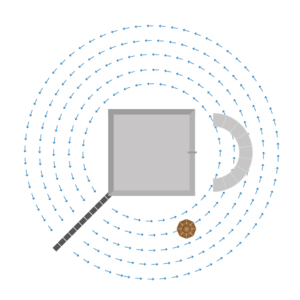
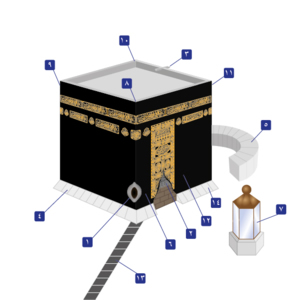
The Two Rak`ahs of Tawaf
After completing Tawaf, a pilgrim prays two Rak`ahs of Tawaf behind Maqam Ibrahim (the station of Abraham) (peace be upon him) even at the end of the Haram or in any place in the Haram, it is permissible in case the Haram is over-crowded.
In the first Rak`ah, he recites Surat “Al Kafirun”, and in the second Rak`ah, he recites Surat “Al Ikhlas” … after “Al Fatihah.”
Allah, the Almighty, says: “And take, [O believers], from the standing place of Abraham a place of prayer.”
He invokes after the prayer: “O Allah! You invited Your servants to Your Sacred House, and I came in response to Your call, begging for Your Mercy and beseeching Your Content, and You have granted me my quest, so forgive me. You are over all things Competent.”
Prophet Muhammad (peace be upon him) said: “The Tawaf around Ka`bah is a prayer, except that Allah has allowed speech therein, so who utters a word should utter only righteous words.” Therefore, it is stipulated in Tawaf to be in the state of purity from ritual impurities and covering private parts (`Awrah).
In case the Tawaf is interrupted either for Salah or for the renewal of ablution, a pilgrim continues Tawaf from the beginning of the round he was performing.
Al Multazam
A pilgrim comes to Al-Multazam (which is between the gate of the Ka`bah and the Black Stone) and invokes there:
“O Allah! Save me from the rejected Satan, save me from everything bad, and make me feel content with what You have provided me and bless it for me.”
Making invocation at Al-Multazam is accepted.
Zamzam Water
It is recommended for a pilgrim to come to Zamzam to drink as much water as he can.
While drinking, he should say: “O Allah! I learnt that Allah’s Messenger (peace be upon him) said: “Zamzam water is for whatever it is drunk for”, so I’m drinking it and invoking: “O Allah! I invoke You to grant me useful knowledge, generous sustenance and cure from every illness.”
“My Lord, admit me into Paradise without torture or reckoning, and favour me with the company of Your prophet and our leader Muhammad (peace be upon him) in the upper Paradise.”
The pilgrim invokes Allah for his needs in the two worlds and sends peace and blessings to the chosen Prophet (peace be upon him).
Staying in Makkah until the 8th of Dhul-Hijjah:
A pilgrim makes the best use of this period by:
- Praying (performing Salah) as often as possible in Al-Masjid Al-Haram (each prayer in Al-Masjid Al-Haram equals one hundred thousand Salah).
- Performing Tawaf as often as possible, for Tawaf is one of the best acts of worship in Al-Masjid Al-Haram.
-
The Prophet (peace be upon him) said:
"He who circumambulates the House for a week and prays two rak`as, will be granted the reward of freeing a slave."
-
The Prophet (peace be upon him) also said:
"Allah bestows everyday upon the pilgrims of His House one hundred and twenty parts of mercy: Sixty are for those who circumambulate the House, forty for those who pray and twenty for those who look (at the Ka`bah)."
So, when a pilgrim goes round the Ka`bah and looks at it, he receives eighty parts of Allah's Mercy.
-
Also the Prophet (peace be upon him) said:
"Whoever circumambulate the House fifty times, he is purified of his sins and returns as pure as the day he was born."
Each time is seven rounds, and after each seven rounds he should pray two Rak`ahs.
First Day: The 8th of Dhul-Hijjah
Heading to Mina
-
In the morning of the 8th of Dhul-Hijjah (The Day of Tarwiyah), after the Fajr prayers, and after sunrise and Doha (forenoon) prayers, all pilgrims head towards Mina.
-
They stay there until the sunrise of the day of `Arafah, and pray in Mina five prayers (Zhuhr, `Asr, Maghrib, `Isha' and Fajr of the following day, the 9th of Dhul-Hijja). While going to Mina, a pilgrim says:
"O Allah! In You is my hope, and to You I supplicate. So, make my best hopes come true, forgive me, grant me a favour as You bestowed upon Your obedient servants, You are over all things Competent."
-
In Mina, a pilgrim invocates saying:
"Our Lord, give us in this world [that which is] good and in the Hereafter [that which is] good and protect us from the punishment of the Fire."
It is a Sunnah (prophetic tradition) to stay for a while and pray in Al-Khif mosque (in Mina).
Second day: The 9th of Dhul-Hijjah (The Day of `Arafah)
-
The pilgrim moves from Mina to `Arafat after sunrise on the day of `Arafah and says on his way:
"O Allah! I headed towards You, seeking for Your Generous Face, so forgive my sin, accept my Hajj and have mercy on me, You are over all things Competent."
-
The pilgrim increases the repetition of Talbiyah and the recitation of the Glorious Qur'an especially: "Our Lord, give us in this world [that which is] good and in the Hereafter [that which is] good and protect us from the punishment of the Fire."
-
He stands in `Arafat, which is all a standing place on that day, but the best place for standing is where Allah's Messenger (peace be upon him) stood at the big rocks at the foot of the Mount of Mercy.
-
Whenever he looks at the Mount of Mercy, he praises Allah and says: "Allahu Akbar" "Allah is the greatest."
-
It is a Sunnah to go to Namirah Mosque to listen to the sermon, and he performs Zhuhr and `Asr prayers together in advance at the time of Zhuhr, with one Adhan (call for prayer) and two Iqamas, praying in congregation with the Imam without performing Sunnah prayers in between.
-
He strives to have a present heart and tries his utmost to cry.
-
He invokes, recites Talbiyah and Qur'an as often as he can, either while standing or sitting. He invokes in a low voice and should be persistent while invocation, and repeat it thrice. He should be facing the direction of the Ka`bah, to start and conclude Du`a' (invocation) by praising and glorifying Allah and sending peace and blessings to the Prophet (peace be upon him).
-
It is a Sunnah for a pilgrim to take a bath to perform the rites of `Arafah.
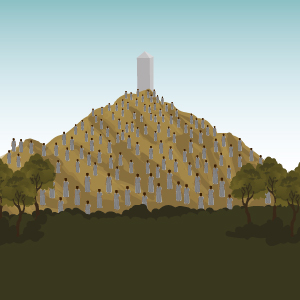
Descending from `Arafah to Muzdalifah
-
When the sun sets on the day of `Arafah a pilgrim leaves to Muzdalifah reciting Talbiyah and Takbir, praising, glorifying and saying: “Allahu Akbar, Allahu Akbar, Allahu Akbar (Allah is the Greatest) three times, La ilaha illa Allah (there is no god but Allah), wa lillah el hamd (praise be to Allah)."
He says: “O Allah! To You I aspire for Your Majesty I pray, so accept my act of worship, guide me, grant me more goodness that I ask for, and never let me down, You are Allah the Most Bountiful, the Most Generous."
-
The pilgrim walks slowly to Muzdalifah in calmness and reverence so as not to cause harm to anyone.
-
When a pilgrim reaches Muzdalifah, he tries to settle near Masjid Al-Mash`ar Al-Haram (Kuzah mountain) if possible.
-
It is advised to say invocation, recitations, Talbiyah and recite as much Qur'an as he can.
-
“But when you depart from `Arafat, remember Allah at Al-Mash`ar Al-Haram. And remember Him, as He has guided you, for indeed, you were before that among those astray. Then depart from the place from where [all] the people depart and ask forgiveness of Allah. Indeed, Allah is Forgiving and Merciful."
-
Then a pilgrim perform Maghrib and `Isha' prayer (after the time due to `Isha') together by one Adhan and an Iqamah and he delays the Sunnah prayer for Maghrib, `Isha' and Witr until after he prays `Isha'.
-
From the invocations of Muzdalifah: “O Allah! I ask You for the preludes (beginnings) of all blessings and its results, combinations, start and end, its outward and inward, and grant me the highest degrees in Paradise, and that You set right for me all my affairs, and that You keep away from me all evil, for there is none who does that but You, and no one offers it generously but You."
He asks for Allah’s forgiveness continuously, and he spends the night in Muzdalifah, until midnight.
-
Then a pilgrim picks up 70 pebbles (small stones which are bigger than the size of chick-pea and smaller than a hazelnut) for throwing Jamarat (pebbles).
-
When the day breaks, it is a Sunnah to pray Fajr prayer at the beginning then a pilgrim says: “Allahu Akbar, Allahu Akbar, Allahu Akbar (Allah is the Greatest) three times, La illaha illa Allah (there is no god but Allah. Allahu Akbar wa Lillah el Hamd (Allah is the greatest and praise be to Allah). He sends peace and blessings to our Prophet Muhammad (peace be upon him) and he supplicates while raising both hands to heaven.
-
It should be noticed that Muzdalifah is all a standing place except for Wadi Muhassar.
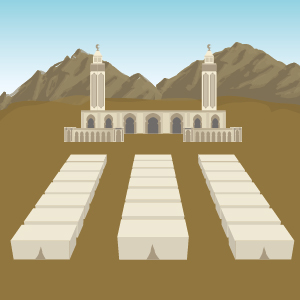
The Third Day: Heading to Mina – The Day of Sacrifice
-
After offering Fajr prayer and before sunrise, a pilgrim leaves to Mina, saying Talbiyah as often as he can. It is desirable for him to say while marching: “O Allah! To You I come, of Your punishment I fear, to You I head feeling awe from Your wrath. O Allah, accept my act of worship, increase my reward, have mercy on my supplication and with Your grace grant me my quest." He also sends peace and blessings to the Prophet (peace be upon him).
-
When he reaches Wadi Muhassar, he fastens his march in that area and says when he comes to Mina:
“Praise be to Allah who enabled me to get here safe and healthy. O Allah! I came to Mina as Your slave and under your control, so I pray to You to favour me with whatever You’ve favoured Your obedient pious men. O Allah! Save me from deprivation and calamity in my faith, You are the Most Merciful of the merciful.
-
The tasks in Mina on the day of sacrifice (Nahr) are numerous, they are: Throwing of Jamarat Al–`Aqabah, offering of sacrifice, Halq (trimming or shaving the hair of the head), Tawaf-ul–Ifadah, As–Sa`y (if he didn’t go for Sa`y before).
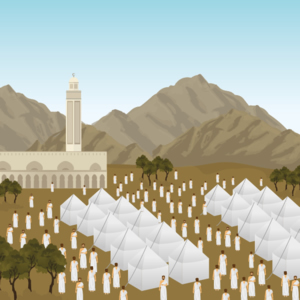
Ramy (throwing) of Jamrat-ul-`Aqabah:
-
A pilgrim throws seven pebbles and says at each casting: “(In the name of Allah), (Allah is the Greatest), in defiance and condemnation of Satan and his party and for Allah’s satisfaction."
-
The pilgrim interrupts Talbiyah when he starts Ar–Ramy.
-
The Time of Ramy is from the dawn of the Day of Sacrifice until the dawn of the next day but in the prophetic tradition (As-Sunnah) Ramy is due between sunrise until the decline of the sun, and Ramy is allowed after sunset and until dawn but it is Makrouh (disliked) except for an acceptable excuse.
-
Throwing the pebbles so as to hit the stone pillar of Al–Jamrah or to fall within the circle surrounding it. A pilgrim stands facing Al–Jamrah so as to place Mina on his right and Makkah Road on his left while Ar–Ramy from over the bridge can be performed from any direction.
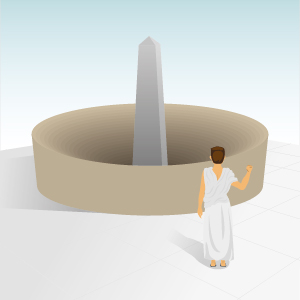
Shaving or shortening the hair:
It is a must to shave or shorten the hair by at least the amount of a fingertip (2 cm) but shaving the head completely with a razor is preferred according to the saying of the Messenger of Allah (peace be upon him):
Ibn Omar narrated that the Messenger of Allah (peace be upon him) said: “May Allah have mercy upon shavers” (who shave the hair of the head) They asked: and shortners (those who shorten the hair) Messenger of Allah? He said: “ May Allah have mercy upon shavers.” They asked: ‘and shortners Messenger of Allah?’ He answered: “May Allah have mercy upon shavers.” They asked: and shortners Messenger of Allah? He said: “and shortners.” As for a woman, she shortens her hair as little as a fingertip.
Dear pilgrim brother, you should know that having your hair cut is a successful trade with Allah; for every single hair you cut is rewarded by removing a bad deed and obtaining a higher degree.
It is advised when shaving to say: “Praise be to Allah for his right guidance, praise be to Allah for the favours He bestowed upon us. O Allah! This is my forehead (means I am totally obedient), so accept from me and forgive my wrong deeds.” “O Allah! Forgive me and the shavers and those who shorten Salah. My Lord, You are ample in forgiveness – Amen!” After he finishes shaving or clipping his hair, he says: (praise be to Allah who helped us to perform this act of worship).
When a pilgrim does that, he releases himself for the smallest release (At-Tahalul Al-Asghar) from Ihram. He is allowed to do whatever was not allowed during Ihram except for sexual intercourse and its causes, which are not allowed until he circumambulates the Ka`bah for Tawaf–ul-Ifadah.
Tawaf-ul-Ifadah
After returning from Mina to Makkah Al-Mukarramah, a pilgrim circumambulates the Ka`bah for seven rounds and prays two rak`as of Tawaf. Then he comes to Al Multazam (a place between the black stone and the Ka`bah gate) Zamzam and hurries between Safa and Marwah for Sa`y unless he had performed Sa`y before.
After performing Tawaf-ul-Ifadah, the pilgrim releases himself from Ihram for the biggest release (At-Tahallul Al-Akbar) i.e. the pilgrim is allowed to do things that were prohibited to do by entering the state of Ihram, which was previously restricted due to Ihram. Then the pilgrim returns to Mina to stay there and spend the night in order to throw the three Jamarat during the three following days.

Umrah
‘Umrah is the lesser pilgrimage and it is derived from Al-I`timar which means “the visit” where Al-Mu`tamer assumes Ihram from the Miqat, performs Tawaf-ul-`Umrah then performs Sa`y and ends his state of Ihram either by hair shaving or hair shortening.
Abu Hurayrah (May Allah be pleased with him) narrated that Allah’s Messenger (peace be upon him) said: “The `Umrah to the following `Umrah is an atonement for what is between them, and the accepted Hajj is not rewarded except by paradise.”
Jabir (May Allah be pleased with him) narrated that Allah’s Messenger (peace be upon him) said: “Pilgrims and those performing `Umrah are the delegation of Allah, when they beseech Him, He will grant them their quest, and when they seek His forgiveness, He will forgive them.”
He who wants to perform another `Umrah should go out to At-Tan`im (the Mosque of lady `A’ishah May Allah be pleased with her) for Ihram then return to Makkah to perform Tawaf and Sa`y.
Ihram
Ihram consists of the intention and Talbiyah. A pilgrim enters the state of Ihram at the Miqat or shortly before, for the sake of his peace of mind. Before entering the state of Ihram, a pilgrim is advised to do the following:
-
Cut his hair or shave it as he used to do before.
-
Clip his nails and remove the pubic hair.
-
Take a bath and perform ablution.
-
Wear white, clean loincloth and wrapper, preferably new.
-
Apply perfume, and pray two Rak`ahs in a permissible time.
-
Afterwards, he intends by heart to offer `Umrah, there is no harm to utter intention as follows:
“O Allah! I intend to perform `Umrah, so make it easy for me and accept it from me. I intend to offer `Umrah and have entered the state of Ihram for the sake of Allah, so if I am detained by anything, my termination of Ihram shall be where I am detained.”
-
Then the pilgrim says the Talbiyah as follows:
“Labbayk Allahuma labbayk, Labbayka La Sharika Laka Labbayk. Inna – alhamda wan-ni`mata Laka walmulk. La Sharika Lak” (Here I am, O Allah! Here I am, at Your service! You have no partner, here I am. All praise, grace and dominion belong to You. You have no partner).
He repeats the Talbiyah three times and concludes by saluting our Prophet Muhammad (peace be upon him).
A pilgrim repeats Talbiyah whenever he climbs a hill, descends a valley, gets into a car or gets out of it, also when he meets friends and acquaintances and at the end of prayers.
Entering Makkah
When a pilgrim approaches Makkah he says:
“O Allah! This is Your Haram and Your secure place, so protect my body from Hell-Fire and save me from Your torture when You will resurrect Your servants and include me among Your obedient pious people”.
-
After entering Makkah a pilgrim says:
-
“O Allah! This is Your town and Your House; I came seeking Your mercy in obedience to Your commands. I pray to You my God in my utmost need, fearing Your torture that You receive me with Your pardon, forgive me with Your mercy and admit me into Your paradise”.
Then he sends peace and blessings to Prophet Muhammad (peace be upon him).

Entering Al-Masjid Al-Haram (the Sacred Mosque)
-
It is recommended to enter through Bab-us-Salam (the gate of Peace).
A pilgrim enters with his right foot, sending peace and blessings to Prophet Muhammad (peace be upon him) and invoking:
“O Allah! Forgive my sins and open for me the gates of Your mercy.”
“O Allah! This is Your Haram and Your secure place, I ask You to protect my flesh, skin, blood, brain and bones from Hell-Fire.”
-
When he sees the Ka`bah, he utters Tahlil and Takbir saying “La-ilaha-illa-Allah, Allahu Akbar” (“there is no god but Allah and Allah is the Greatest”)
-
He repeats this Tahlil and Takbir for three times raising his hands and supplicating because the supplication made at sighting the Ka`bah is accepted:
“O Allah! Make my invocations accepted in all that which is good.”
“I seek protection from the Lord of the House against debt, poverty, narrowness of the chest and from the torture of the grave.”
“O Allah! I beseech You to pardon me, grant me mercy and save my neck from the Hell-Fire.”
-
Or a pilgrim invokes Allah to grant him whatever he needs and he sends peace and blessings to Prophet Muhammad (peace be upon him) saying: “O Allah! Increase the honour, dignity, and reverence of Your Sacred House and increase whoever visits it either in Hajj or `Umrah in honour, respect, nobleness, and righteousness.” “O Allah! You are peace, and from You comes peace. Our Lord, receive us with peace.”
Tawaf
-
At the beginning of Tawaf, it is recommended for a pilgrim to face the Ka`bah, placing the Black Stone on his right. Then he moves to position himself to face the Black Stone and intends Tawaf (either the Tawaf of `Umrah or Tawaf Al-Qudum).
-
He starts from the brown marble line saying: (Bismillah, Allahu Akbar) “In the name of Allah, Allah is the Greatest.” “O Allah! Having faith in You, confirming the truthfulness of Your Holy Book, fulfilling Your promise and following the Sunnah of Your Prophet (peace be upon him).”
-
The pilgrim touches the Black Stone and kisses it, if possible.
-
If it is too difficult to kiss it, he touches it with his right hand and kisses his hand.
-
If that isn’t possible he stands facing the Black Stone and points to it with his hand once while saying: “Bismillah, Allahu Akbar” (in the name of Allah, Allah is the Greatest). Then he starts Tawaf.
How to point correctly to the Ka`bah?
A pilgrim raises his hands alongside his shoulders making the inner part of his hands (palms) directed towards the Black Stone and he points to the Ka`bah with his hands one time only.
-
Tawaf is performed seven rounds and it is part of the Sunnah to move quickly (Ramal) in the first three rounds and exposing the right shoulder by throwing the upper sheet of the Ihram dress over the left shoulder (Idtiba` - for males only) during all rounds.

-
This case is only for Tawaf, which is followed by Sa`y between Safa and Marwah.
-
Ramal and Idtiba` are only for men and are practiced only during Tawaf, which is followed by Sa`y. So, whenever a pilgrim finishes Tawaf, he covers his shoulders.
-
A pilgrim (during Hajj) recites at the gate of the Ka`bah:
“O Allah! The House is Yours, and the Haram is Yours, and the peace is Yours, and this is the place of he who seeks Your protection.”
-
He says at the Iraqi Corner:
“O Allah! I seek refuge in You from doubt and from shirk, from discord, hypocrisy, ill-manners, and calamity in property, family, and children.”
-
He says between the Shami Corner and the Yamani Corner:
“O Allah! Make my Hajj accepted, my effort accepted and recognized, my sin pardoned, my deeds accepted and grant me a trade that will never fail, You are the Exalted in might, the Oft-Forgiving.”
-
Istilam (touching) the Yamani Corner is desirable whenever the pilgrim passes by it during Tawaf, by touching the Corner with his palms or with his right hand. If this is not possible, he should point towards it. Invocation is recommended at the Yamani Corner because it is surely accepted since there are seventy thousand angels there who say “Amen.”
In order for the Tawaf to be correct, a pilgrim must stop completely at the Yamani Corner.
-
A pilgrim recites between the Yamani Corner and the Black Stone: “Our Lord, give us in this world [that which is] good and in the Hereafter [that which is] good and protect us from the punishment of the Fire.”
“O Allah! Save me from disbelief, want, and disgraceful situations in this world and in the Hereafter.”
-
He invokes often in the first three rounds: “O Allah! Make my Hajj accepted, forgive my sins, accept and recognize my effort.”
-
He recites in the other four rounds: “O Allah! Forgive, grant mercy, pardon and favour, and excuse us for things You know about us, You are the Most Powerful, the Most Generous.”
-
A pilgrim makes continuous invocations, asking for the good of this world and the good of the Hereafter.
-
At the end of the Tawaf, a pilgrim touches and kisses the Black Stone or points at it with his palms and at each time he passes in front of it during Tawaf.


The Two Rak`ahs of Tawaf
After completing Tawaf, a pilgrim prays two Rak`ahs of Tawaf behind Maqam Ibrahim (the station of Abraham) (peace be upon him) even at the end of the Haram or in any place in the Haram, it is permissible in case the Haram is over-crowded.
In the first Rak`ah, he recites Surat “Al Kafirun”, and in the second Rak`ah, he recites Surat “Al Ikhlas” … after “Al Fatihah.”
Allah, the Almighty, says: “And take, [O believers], from the standing place of Abraham a place of prayer.”
He invokes after the prayer: “O Allah! You invited Your servants to Your Sacred House, and I came in response to Your call, begging for Your Mercy and beseeching Your Content, and You have granted me my quest, so forgive me. You are over all things Competent.”
Prophet Muhammad (peace be upon him) said: “The Tawaf around Ka`bah is a prayer, except that Allah has allowed speech therein, so who utters a word should utter only righteous words.” Therefore, it is stipulated in Tawaf to be in the state of purity from ritual impurities and covering private parts (`Awrah).
In case the Tawaf is interrupted either for Salah or for the renewal of ablution, a pilgrim continues Tawaf from the beginning of the round he was performing.
Al Multazam
A pilgrim comes to Al-Multazam (which is between the gate of the Ka`bah and the Black Stone) and invokes there:
“O Allah! Save me from the rejected Satan, save me from everything bad, and make me feel content with what You have provided me and bless it for me.”
Making invocation at Al-Multazam is accepted.
Zamzam Water
It is recommended for a pilgrim to come to Zamzam to drink as much water as he can.
While drinking, he should say: “O Allah! I learnt that Allah’s Messenger (peace be upon him) said: “Zamzam water is for whatever it is drunk for”, so I’m drinking it and invoking: “O Allah! I invoke You to grant me useful knowledge, generous sustenance and cure from every illness.”
“My Lord, admit me into Paradise without torture or reckoning, and favour me with the company of Your prophet and our leader Muhammad (peace be upon him) in the upper Paradise.”
The pilgrim invokes Allah for his needs in the two worlds and sends peace and blessings to the chosen Prophet (peace be upon him).
Sa`y between Safa and Marwah
A Pilgrim ascends the mount of As-Safa so as to see the Ka`bah (if possible) from the Safa gate. While ascending, he recites:
(‘Indeed As-Safa and Al-Marwah are among the symbols of Allah. So, whoever makes Hajj [pilgrimage] to the House or performs `Umrah - there no blame upon him for walking between them. And whoever volunteers good - then indeed, Allah is appreciative and knowing”)
Then he repeats this supplication for three times: “Allah is the Greatest, Allah is the Greatest. Allah is the Greatest and all praise belongs to Him (Allah is the Greatest for leading us to the right way and all praise belongs to Him for His offerings.”
“There is no God except Allah, Alone with no partner.” He is the Lord of everything. All praise belongs to Him who gives life and causes death, all good is bestowed by Him and He empowers all things. He has kept His promise, aided His Servant, empowered his troops and defeated the allies Alone.
There is no god but Allah, we do not worship but Him with utmost sincerity even if the disbelievers detest it.
O Allah! You told us “invoke me, I’ll respond to you” and You do not break your promise, so I beseech You as You guided me to Islam not to strip it from me till You inflict death on me as a true Muslim (three times).
Then he sends peace and blessings to our Prophet Muhammad (peace be upon him) and invokes when he descends from As-Safa at each round: O Allah! I ask You for the causes of Your mercy, motives for Your forgiveness, escape from all sins, reward for every good deed, and make me worthy of paradise and protect me from the Hell-Fire.
It is part of the Sunnah to jog between the two green slopes (jogging is only for men) where a pilgrim invokes: “Our Lord! Grant us good in this world and good in the Hereafter and save us from the torture of Hell. My Lord! Forgive and have mercy, pardon and favour us, and pass over what You know. You are the All Glorious, the All Generous. My Lord! I beg You for guidance, piety, chastity and self–sufficiency. My Lord! Support me in praising, thanking and worshipping You.”
When he reaches Al-Marwah, he would have completed one round. He completes seven rounds starting initially from As-Safa and concluding finally at Al-Marwah. When the pilgrim stands at Al-Marwah, he recites: “Indeed As-Safa and al-Marwa are among the symbols of Allah………..etc”
He also utters the same supplications he mentioned at As-Safa. A pilgrim utters Talbiyah during Sa`y but the mu`tamir (one performing `Umrah) does not.
It is preferable to pray two Rak`ahs (better in Al-Haram) after concluding the seventh round.
A pilgrim is advised to say during Sa`y some recitations, invocations and whatever he can from the Glorious Qur’an.
He invokes after he concludes Sa`y: “ Our Lord! Accept this from us, grant us safety, pardon us and support us to obey and praise You.”
Idtiba` is not a condition for Sa`y according to the Hanafi school of Fiqh (though it is a condition according to the Shafi`y school).
Purification is not a condition for the correctness of Sa`y but as Al Mas`a is within Al-Haram, purification is preferable.
In the case of interruption in Sa`y because of prayer or any other reason, the pilgrim resumes Sa`y from where he stopped.
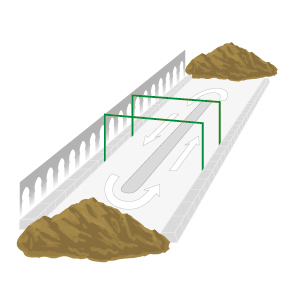
Shaving or shortening the hair:
It is a must to shave or shorten the hair by at least the amount of a fingertip (2 cm) but shaving the head completely with a razor is preferred according to the saying of the Messenger of Allah (peace be upon him):
Ibn Omar narrated that the Messenger of Allah (peace be upon him) said: “May Allah have mercy upon shavers” (who shave the hair of the head) They asked: and shortners (those who shorten the hair) Messenger of Allah? He said: “ May Allah have mercy upon shavers.” They asked: ‘and shortners Messenger of Allah?’ He answered: “May Allah have mercy upon shavers.” They asked: and shortners Messenger of Allah? He said: “and shortners.” As for a woman, she shortens her hair as little as a fingertip.
Dear pilgrim brother, you should know that having your hair cut is a successful trade with Allah; for every single hair you cut is rewarded by removing a bad deed and obtaining a higher degree.
The least duty according to Abu Hanifah is the quarter of the head, whereas three hairs according to Al Shafi`y, but according to Malik it is shaving or shortening all the head. (Do not forget that imitating schools of Fiqh is permissible).
It is advised when shaving to say: “Praise be to Allah for his right guidance, praise be to Allah for the favours He bestowed upon us. O Allah! This is my forehead (means I am totally obedient), so accept from me and forgive my wrong deeds.” “O Allah! Forgive me and the shavers and the shortners. My Lord, You are ample in forgiveness – Amen.” After he finishes shaving or clipping his hair, he says: (praise be to Allah who helped us to perform this act of worship).
When a pilgrim does so, he terminates his Ihram, and he is allowed to do whatever was not allowed during Ihram.
He who wants to perform another `Umrah should go to At-Tan`im (the Mosque of lady `A’ishah, may Allah be pleased with her) to enter into the state of Ihram then return to Makkah to perform Tawaf and Sa`y.
Forbidden acts during Ihram
-
Al Rafath: A husband and a wife are not allowed to have intimate relations (sexual intercourse, any of its causes nor even touch or kiss …etc.)
-
Fusuq: Disobedience.
-
No quarrelling or arguing which leads to anger, insult, and fight.
-
Wearing sewn clothes (for men).
-
The cutting of hair.
-
The use of perfume (or anything of a good odour).
-
Clipping nails.
-
Covering the head (for men).
-
Hunting.
-
Cutting trees.
-
Wearing socks and full shoes. Pilgrims may wear any shoes that show the instep.
-
Covering the face and feet during sleep.

Permissible acts in Ihram
-
Taking a shower intending purification, cleanness, or for refreshment without using any scented soap, shampoo or toothpaste.
-
Pulling out a tooth.
-
Setting broken bones.
-
Rubbing of the head or the body very gently without causing any hair to fall. If any hair falls, he must offer alms to the poor.
-
It is permissible to wear sandals, a ring, glasses, earphones, a watch, a belt and wallet for keeping money and papers.
-
A pilgrim can change and clean Ihram dress but this act is not recommended.
